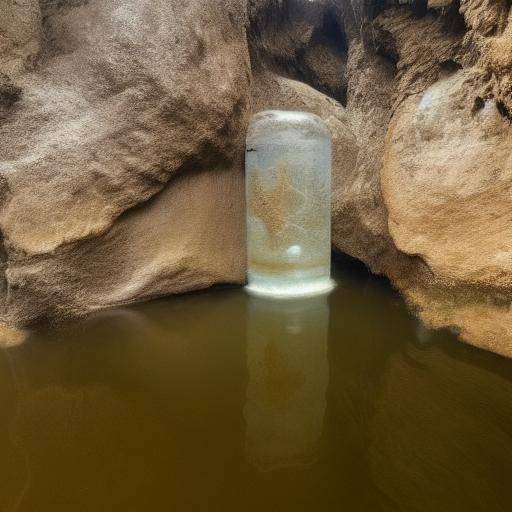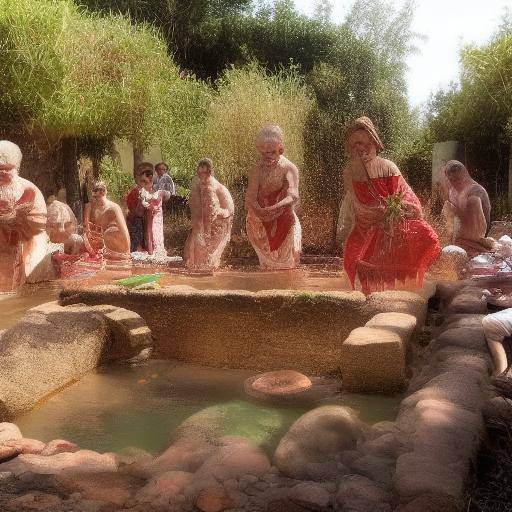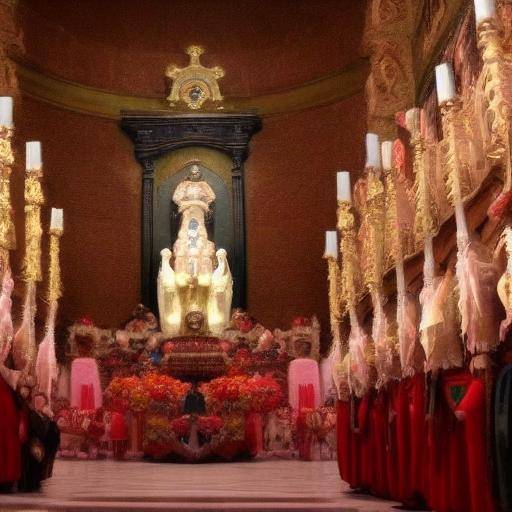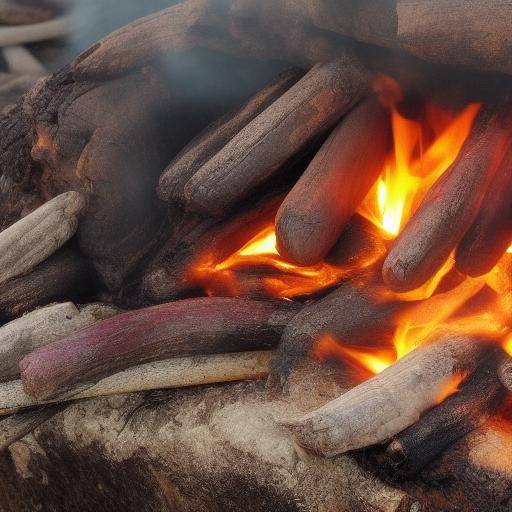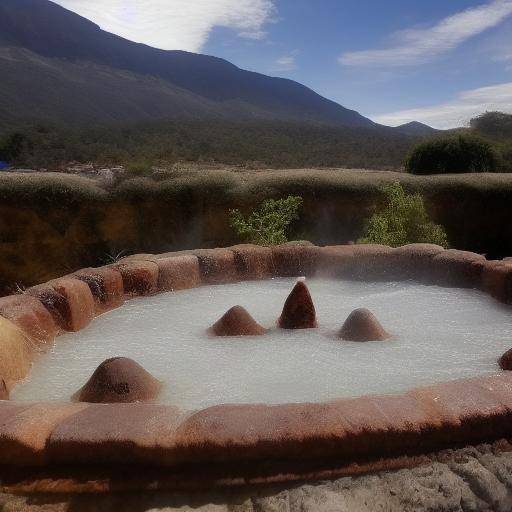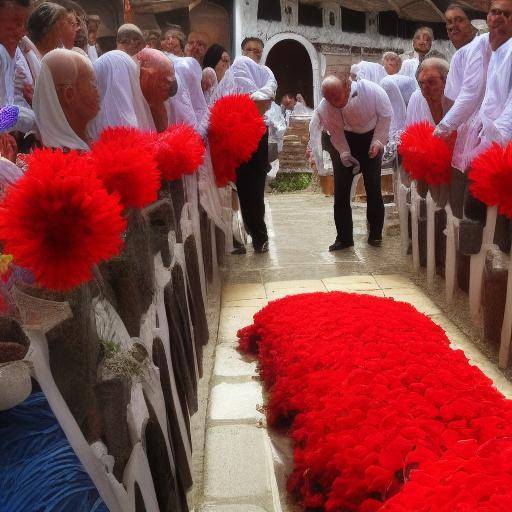
Introduction
The role of water in funeral traditions is a subject of deep cultural and spiritual significance in various societies around the world. From ancient rituals to contemporary practices, water has played a crucial role in the farewell of loved ones and in the transition of the soul to the beyond. In this article, we will explore the profound importance of water in funeral traditions, analyzing its historical roots, its meaning in different cultures, its application in contemporary rituals, and its crucial role in the mourning process. Throughout this exploration, we will discover the transcendence of water as a vital element in the celebration of life and the transition to death.
History and Background
The role of water in funeral traditions dates back to time immemorial, witnessing the evolution of beliefs and rituals associated with the passage of life to death. From ancient civilizations to contemporary practices, water has been considered a means of purification, renewal and spiritual connection. In cultures such as the Egyptian, the Nile River had a transcendental meaning in the funerary process, serving as a symbol of fertility and rebirth, while in the Hindu tradition, the Ganges River is venerated as a sacred place for the cremation and scattering of ashes. Throughout history, water has been a central element in funeral rituals, symbolizing the transition of the soul to the beyond and the purification of the body on its last journey.
The emergence of monotheistic religions has also left a mark on funeral traditions, with baptism and ritual ablutions playing a significant role in the farewell process. The holy water and its ability to purify the soul have been fundamental in Christian funeral ceremonies, while in Islam, the washing of the body of the deceased before the tomb is considered a sacred act of purification. These examples illustrate the transversal importance of water in funeral traditions, transcending cultural and religious borders.
Deep analysis
The connection between water and funeral traditions goes beyond mere ritual practices, covering emotional, psychological and symbolic aspects. Water not only fulfills a purifying function, but also represents the idea of renewal and continuity. In a contemporary context, the stage of mourning after the loss of a loved one can find comfort in the connection with water, either through contemplation on the shore of a lake, the symbolic act of spreading ashes in the ocean, or the simple flow of a stream that evokes the quietness of the mind and the acceptance of transformation.
On the other hand, proper water care at funeral ceremonies also poses practical and environmental challenges. The need to preserve water bodies from pollution, as well as to ensure responsible management of water resources used in these rituals, is an important ethical and ecological consideration. In this sense, the collective awareness of the preservation of water and its meaning in funeral traditions highlights the interconnection between spirituality, sustainability and respect for nature.
Integral Examination
The wide range of applications that water has in funeral traditions encompasses a variety of practices and rituals, from cremation ceremonies on the banks of sacred rivers to commemorative services along with sources or lakes. The choice of the place where the funeral ritual is performed, as well as the way water is part of it, refers to the deep connection between humans and the vital element that is water. This aspect highlights the universality and flexibility of funeral traditions in their relation to water, adapting to different geographical, cultural and religious contexts.
Moreover, the importance of water in funeral traditions is not only limited to the religious or spiritual sphere, but also extends to artistic and creative expression. In some cultures, poetry, music and dance have found inspiration in the metaphor of water as a symbol of transition and transcendence, thus enriching the experience of mourning and the celebration of life. This intimate relationship between water and artistic expression underlines its profound emotional impact and its ability to nourish the soul during the processes of loss and commemoration.
Comparative analysis
By comparing the role of water in funeral traditions with other symbolic elements, such as fire or earth, there is a unique intersection between the physical and the spiritual. While fire represents the transformation and liberation of the spirit, and the earth symbolizes the connection with material and fertility, water emanates a quality of fluidity, purification and renewal. This distinction reveals the diversity of funeral meanings and practices in various cultures, as well as the symbolic wealth that water brings to the process of farewell and transformation.
Practical Tips and Accessible Recommendations
In considering the incorporation of water into funeral ceremonies, it is pertinent to take into account logistical and environmental aspects. For those who wish to honor their loved ones through the presence of water, it is important to investigate and respect local regulations related to the management of water bodies, as well as to consider sustainable and respectful practices with the natural environment. In addition, early planning and open communication with ritual participants can facilitate meaningful and respectful experience for all involved. In the emotional plane, the connection with water can offer comfort, calm and reflection during the mourning process, providing a space for introspection and connection with nature.
Industry Perspectives and Expert Reviews
The intersection between water and funeral traditions has awakened the interest of experts in fields ranging from psychology to ecology. Including anthropologists, cultural historians, spiritualists, and environmental activists, experts from various disciplines have explored the meaning and evolution of funeral practices related to water. Their perspectives reveal the complexity and cultural wealth surrounding this subject, as well as the importance of preserving and understanding funeral traditions in a constantly changing world.
Case Studies and Practical Applications
A variety of case studies illustrate the many ways water has been integrated into funeral traditions around the world. From the moving ceremonies on the banks of the Ganges River in India to the contemporary rituals of spreading ash in aquatic parks in Japan, each culture and community have developed unique practices that find in water an element of healing, connection and transcendence. These examples offer a view of the diversity and depth of water-related beliefs and practices in the context of farewell.
Future Trends and Predictions
As attitudes towards death and grief change, and awareness of environmental sustainability and preservation grows, funeral traditions are expected to continue to evolve to more consciously integrate the role of water. Global technology and connectivity can also influence how people access, share and reinterpret water-related funeral practices. In addition, new interdisciplinary perspectives are likely to emerge that address the importance of water in funeral traditions, combining science, spirituality and creativity to enrich the way we say goodbye to our loved ones and honor their lives.
Conclusion
In short, the role of water in funeral traditions transcends the purely ceremonial to address emotional, cultural, spiritual and environmental aspects. This vital element has been a symbol of purification, rebirth and connection throughout history, and continues to play a fundamental role in the process of mourning and celebrating life in various cultures around the world. The understanding and appreciation of the importance of water in funeral traditions invites us to reflect on our relationship with nature, spirituality and the continuity of life beyond death.
Frequently asked questions
Why is water so significant in funeral traditions?
Water is significant in funeral traditions due to its multiple symbolisms, including purification, renewal, spiritual connection and transcendence. His presence relates to the celebration of life and the passage of the spirit to the beyond.
In which cultures does water play a crucial role in funeral rituals?
Water is deeply rooted in the funeral traditions of various cultures, including Egyptian, Hindu, Christian, Islamic, and many others that worship rivers, lakes and oceans as sacred places for the passage to another life.
How does water care relate to funeral ceremonies?
Water care at funeral ceremonies is crucial to ensuring responsible and sustainable practice. This involves respecting environmental regulations, preserving the purity of the water bodies used in rituals, and fostering a collective awareness of the importance of responsible water resources management.
How can water be significantly incorporated into contemporary funeral ceremonies?
The incorporation of water in contemporary funerary ceremonies can take place through rituals of ashes in the sea, lakes or rivers, the celebration of commemorative services near water sources, or the creation of spaces of reflection in natural environments that involve water as a symbolic element of connection and transition.
What are the current trends related to the role of water in funeral traditions?
Current trends show greater awareness of the importance of water in funeral traditions, promoting sustainable and environmentally friendly practices, as well as the development of personalized rituals that integrate water in a meaningful way in the process of mourning and commemoration.
What is the emotional and spiritual impact of water on funeral traditions?
The emotional and spiritual impact of water on funeral traditions ranges from comfort and calm during duel, to symbolize the continuity of life and the connection with the transcendent. His presence nourishes the soul and offers a space for emotional reflection and healing.
Conclusion Water, with its ability to purify, renew and connect, continues to play a crucial role in funeral traditions, transcendiend











